Wisconsequences: What Happened This Week and What's Next (Up First: the Voter ID Bill)
by Abe Sauer
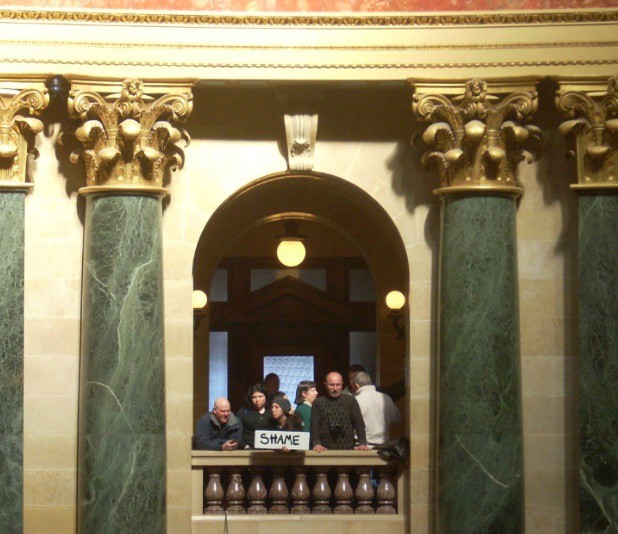
On Wednesday night, Wisconsin’s state senate amended Governor Scott Walker’s budget bill and speedily voted it through, using a loophole that made a quorum unnecessary. Just 24 hours later, after a couple hours of “discussions” that turned the assembly chamber into a straw man carnival and included a motion to remove the majority speaker on the grounds of “impaired judgment,” the Assembly voted to pass the bill. Walker will sign off, after some legal questions are answered. There will be lawsuits, and consequences.
“Elections have consequences” was the hammer used to drive the spike that has now severed union employees from collective bargaining. So that is now the call of Democrats and pro-union activists, who’ve committed to a large-scale, state-wide recall effort to turn those who voted for the bill into “consequences.” But after the passage of the budget “repair” bill, which vastly reduces the financial power of unions to support Democratic pro-union candidates, Republicans have a whole new trick up their sleeve to make sure that future elections have no such consequences.
“Ultimately, I voted my conscience which I feel reflects the core beliefs of the majority of voters who sent me here to represent them,” said Senator Dale Schultz on Wednesday night. A moderate Republican from the “swing” county of Sauk, Schultz’s lone no-vote was joined by four other Republicans in the assembly.
In the last few weeks as Walker has claimed that he’s giving local leaders the tools they need, more and more of these leaders have come forward to declare that they did not ask for a berth as wide as Walker means to provide. Miles Turner, executive director of the Wisconsin Association of School District Administrators, told the Isthmus: “We’ve sought significant modifications in bargaining laws, but we’ve never sought to eliminate collective bargaining rights.” Turner reiterated that his organization, which represents nearly all 424 Wisconsin school districts, did not support eliminating collective bargaining.
The Isthmus also spoke with Dan Thompson, executive director of the League of Wisconsin Municipalities, representative of nearly 600 of the state’s towns, who said, “The governor gave us a great deal more flexibility than we asked for.” Thompson pointed out that the bill’s limitation to cost-of-living increases will cripple abilities to compete with the private sector, the exact kind of commutative equality Walker claims his bill promotes.
So, to be perfectly clear, despite how Walker’s cuts and union dissolving measures are pitched as being undertaken because Wisconsin had “no choice,” it was all about choice. Wisconsin looked at its budget, and it chose to make massive cuts to education. Instead of making across the board, equilateral cuts, including minor tax increases and union concessions, Walker chose to balance his entire budget on the back of education. That’s it. It was a conscious decision. They should own it.
On Wednesday and Thursday of this week, Republicans owned it. They owned the hell out of it.
Kevin Gibbons, co-head of the Teaching Assistants’ Association which has ceaselessly worked to organize and mobilize protesters over the last three weeks, said that in the run up to the vote, he believes the Republican leaders manipulated the police to create the conditions under which something unpleasant would happen, creating a PR win against the demonstrators. “[Wednesday] night they rushed that vote at the exact moment the capitol was to be closing without telling the police,” he said. He thinks they had to know it would cause an explosion of rage that the police didn’t have the numbers in place to deal with. Gibbons said that usually super-cool Capitol Police Chief Tubbs had become visible enraged Wednesday night by the position into which he had been forced. Madison radio station WORT reported that the Wisconsin Law Enforcement Association was seeking legal protection from possible illegal use of State Patrol by Republicans during the crisis.
If true, it appeared to have worked Thursday morning, as the Capitol remained locked well past the 8 a.m. opening time. As rumors that the assembly was aiming to vote on the bill with the doors locked (a violation of the state constitution), thousands and thousands of protesters arrived. Many banged on the doors, and hard. With little information about what was going on inside beyond “security concurs,” increasingly upset demonstrators grew angrier. That the doors were even locked to all press only increased suspicions. Adding to the information vacuum, the police outside had no information beyond that they were to let “nobody in.”
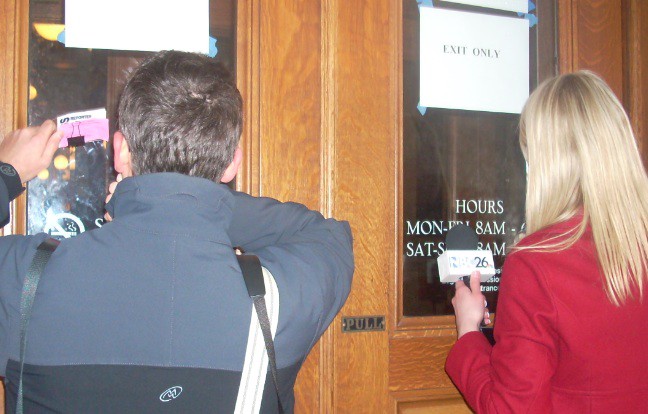
At about 11 a.m., the time the assembly had set to convene the special session, hundreds of the high school students I had seen a half an hour earlier marching up East Washington Avenue joined the growing number of “rabid leftists” at the dome on the hill. They convened at the West Washington doors, which also happened to be the (supposed) designated press entrance.
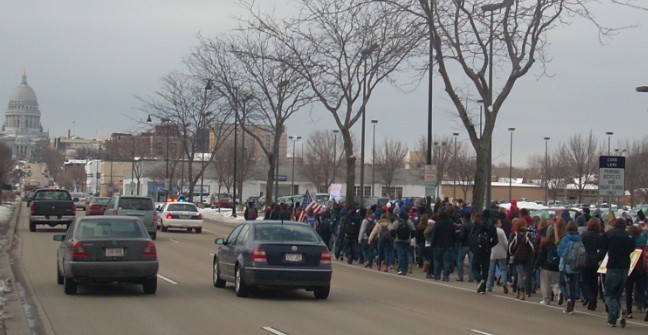
In a display of “fair and balanced” spite so shockingly naked and grotesque that it must be mentioned, the cameraman for WLUK Fox 11, northwest Wisconsin’s Fox affiliate, mocked the peaceful and happy teens. “Do you even understand the issues?!” he yelled at them. I took a picture of him, because, even forgetting that he works for an ostensible news organization, what kind of soulless dirtbag criticizes teenagers for being engaged in politics, much less politics that directly affect their lives?

Press was finally allowed in and rushed to the assembly chamber.
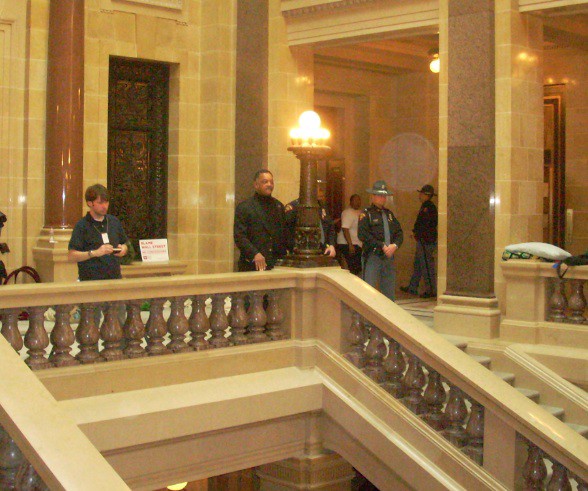
Democrats attempted to stall the vote, repeatedly revisiting questionable tactics of the Republican leadership. Minority Leader Peter Barca introduced a motion to remove Assembly Speaker Fitzgerald from his position, citing his breaking of open meetings law and “impaired judgement.” Speaker Pro Tem Bill Kramer sipped from a can of Mountain Dew and chuckled.
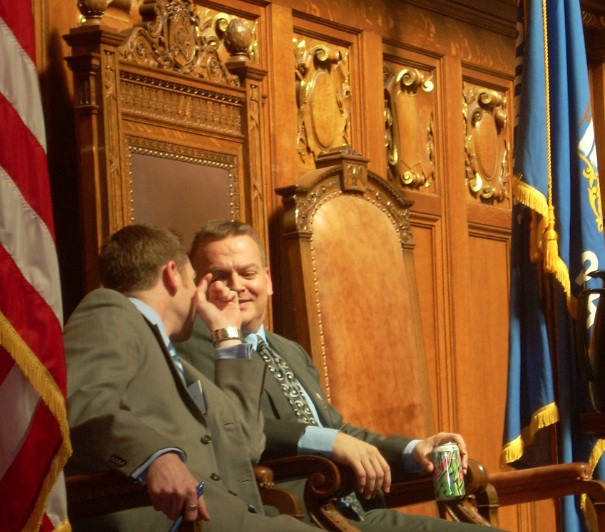
What followed was the kind of non-partisan rhetorical display that obliterates a normal person’s opinion that somebody must somehow be extremely intelligent to be able to put together a campaign and win an elected seat at a level as high as the state capitol.
Democratic Rep. Cory Mason argued that “Martin Luther King was assassinated fighting for the rights you’re trying to take away.” Rep. Barca held a lit lighter aloft and, on the way to making a point of some kind, declared there were no written rules that he could not burn down the building.
Republican Rep. Jeff Fitzgerald (Scott Fitzgerald’s brother) then read a death threat addressed to Republicans from somebody quite clearly unrepresentative of three weeks of tens of thousands of peaceful protesters. Then he said that people were sick of politicians on both sides saying one thing and then coming to Madison and doing another, ignoring that, for instance, Ed Brooks (R-50) did exactly that to the teachers union that endorsed him. Rep. Robin Vos said that “voters made a choice for a new direction,” the three-dollar version of “elections have consequences,” and then defended the bill the Republicans had introduced as being the same thing Obama had done on the federal level.
It’s notable that none of the display in the assembly chamber could hold a candle (or, in Barca’s case, a lighter) to Governor Walker’s morning press conference. In it, the governor, praising the Senate’s passage of the bill the night before, warned against allowing “influences from outside of Wisconsin to come in our state.” That came after Megan Sampson, the teacher he named in his Thursday morning Wall Street Journal op-ed as a beneficiary of his policies, turned out to have written a week earlier on her blog “So, please, for those of you reading this, please know that I am NOT anti-union, and I do not appreciate the way my story is used to pin blame or negativity on unions.”
Democrats slipped Reverend Jesse Jackson into a speaking opportunity in the assembly by way of a prayer. What were Republicans going to do, not allow a prayer? But Jackson’s presence itself ended up being far more partisan than his words.
Whatever one’s opinion of Jesse Jackson may be, his capital-P Presence is undeniable. Like watching a History Channel recreation of an iconic moment, it transports one to, if not the actual moment, then to a place where one could at least begin to imagine the significance of that moment.
Jackson talked with me about how there was no draft for students now and so today’s youth don’t pay for our wars in blood, but in money, in the form of debt. Then I lost him on a tangent about forgiving student loan debt as an economic stimulus.
But then: “What would you say to young people who’ve taken part in all of this in Wisconsin… those who see all the effort and yet none of it seemed to matter?”
“Transformative struggles require persistence and long distance runners,” he said. “We need long distance runners.”
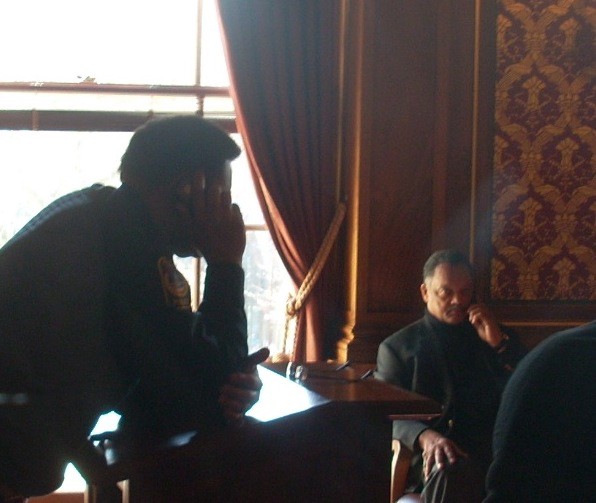
Even before the vote Thursday afternoon, the TAA’s Gibbons conceded the bill would pass, saying it is no longer about killing the bill, but about a recall effort. “The key is to keep this momentum and interest and engagement up and funnel it into recall efforts,” he said. “We can’t let this energy go.” Gibbons added that the methods with which the Republicans finally did pass the bill probably helped increase engagement more than any TAA email campaign.
He’s right. After the capitol was “reclaimed” by the state and went back to regular hours, protesters no longer stayed the night. The vibe of the movement changed; the energy certainly dropped. Protesters were still showing up every day and passions were high, but as with anything else that comes to have regular hours, monotony sets in and passion wanes.
But with the two rushed votes in a questionable atmosphere of openness — a capitol closed against court order and wide reports of Democratic legislators who themselves had trouble entering the building (one reportedly had to break in though a window) — outrage has rebounded.
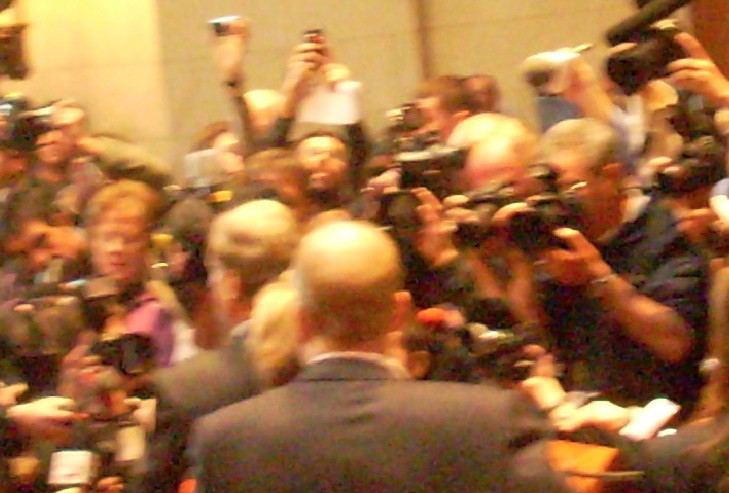
“See you in the courts!” came the scream from the gallery as the Republicans skedaddled out the back door of the assembly chamber. The vote happened so fast hardly anyone even knew what had occurred. (Staffers in the antechamber asked one another, “What the hell just happened? Did they vote? Was there a vote?”)
It looks like the anonymous man in the gallery was right. Outgoing Dan County Executive Kathleen Falk was celebrated when she announced that she had “directed our county attorneys to take legal action today to ensure the laws and rules followed by public policymakers in this state for generations are followed.”
One Republican who probably doesn’t appreciate his party’s recent methodologies is conservative Supreme Court Judge David Prosser, who faces a reelection battle on April 5th. It’s possible that even the Club for Growth’s heavily lopsided spending in favor of Prosser, which has been as dirty as dirty can be , will be enough to save him.
Prosser may be the first reverse swing “consequence” of an election that is just weeks away. In addition to a supreme court judge, Wisconsinites will pick school board members, all positions that may prove in the coming year, as lawsuits are elevated and districts weight their options of how to use Walker’s “tools,” even more important than anyone in the legislature or Governor’s mansion. All the show of solidarity warm fuzzies aren’t worth much if the same energy doesn’t carry to the polls.
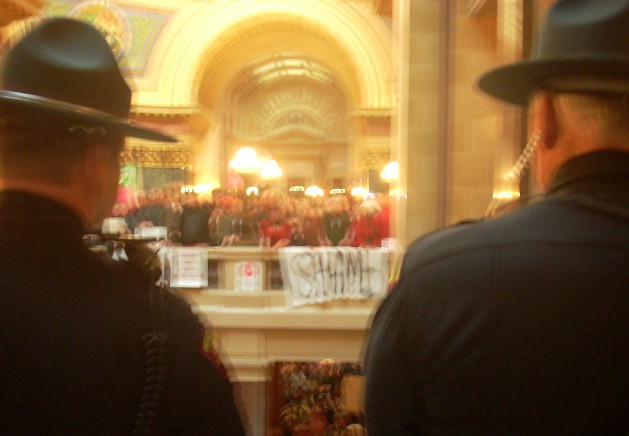
One way some of the Republicans may be able to salvage their political careers in the state is through another insidious bit of legislation, a voter ID bill. This will be one of the first pieces of legislation the Republican-run legislature picks up in the April session after the return of the 14 Democratic senators, who will still be powerless to stop them.
The Republican leadership is already selling its Voter ID bill as a “compromise.” The compromise was that the bill now adds more forms of acceptable identification: in addition to driver’s licenses, the list now including tribal IDs, naturalization papers and passports. Yes, the amended bill now includes passports.
Wisconsin Republicans have had a hard-on for a voter ID bill for years. Democratic Governor Jim Doyle vetoed all of them in recent years. There will be no such veto this time.
Wisconsin Senator Mary Lazich (R-New Berlin) said of the amended bill, “Ensuring integrity of elections is of utmost importance in our democracy. Requiring voters to show photo identification is a reasonable step and one that is constitutional.”
A year ago, when Wisconsin still had a Democratic governor, the Wall Street Journal’s John Fund made a huge case about voter fraud in Wisconsin. His criticisms were that a bill encouraging voter turnout “was suddenly introduced and rushed forward with only abbreviated hearings.” Fund has been a huge defender of recent Republican actions in Wisconsin.
At the time, Fund cited all kinds of bogus data that painted a picture of a state where voting seemed essentially little different from, say, Afghanistan. But Republican Attorney General J.B. Van Hollen has taken action on 20 cases of voter fraud in millions of votes cast since 2008. The New York Times notes that prosecutors “have lost almost twice as many cases as they won” and that many of these chargers were against “felons seemingly unaware that they were barred from voting.”
The Brennan Center for Justice at NYU School of Law points out that in the 2004 election (the same one Fund went all apoplectic over), Wisconsin voter fraud allegations “yielded only 7 substantiated cases” amounting to “0.0002% within the state as a whole.”
And none of those cases could even have been prevented with a Voter ID law anyway.
What makes those tiny handful of voter fraud cases even more significant is that Wisconsin as a whole has one of the highest voter turnout rates in the nation (70.9 percent in 2008) and the state consistently has one of the three highest voter turnout rates for those under 30, many of them students. Guess which party for which they overwhelmingly vote? (Hint: Not the party that has introduced a voter ID bill, especially one that does not recognize student IDs).
Still, if the Voter ID bill passes, and it will, it will most disenfranchise the elderly, low income and minority voters. Both parties have voters within this group, so the tragic thing is that Republicans are willing to disenfranchise their own voters, as long as they get more of the other guys’ then their own. Democracy!
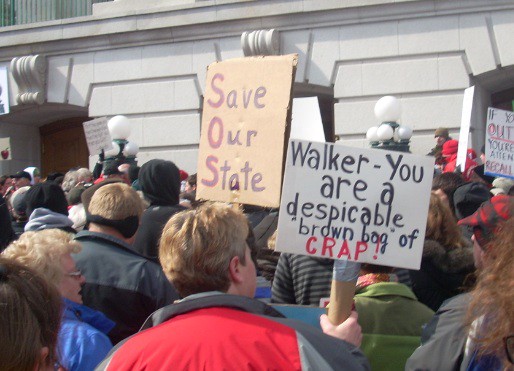
Will the energy from the union-busting “war on teachers” cross over to less sexy, more administrative war on enfranchisement? Maybe. For now, political activism on both sides remains high in Wisconsin and it reams overwhelmingly peaceful and civil, despite lies to the contrary. Satisfying every news outlet with an unused Wisconsin joke, the state farmer’s union will be rallying at the capitol Saturday…. with a “tractorcade.”
It’s going to be a long five months in Wisconsin until the first Packers preseason game.
Abe Sauer can be reached at abesauer at gmail dot com.
